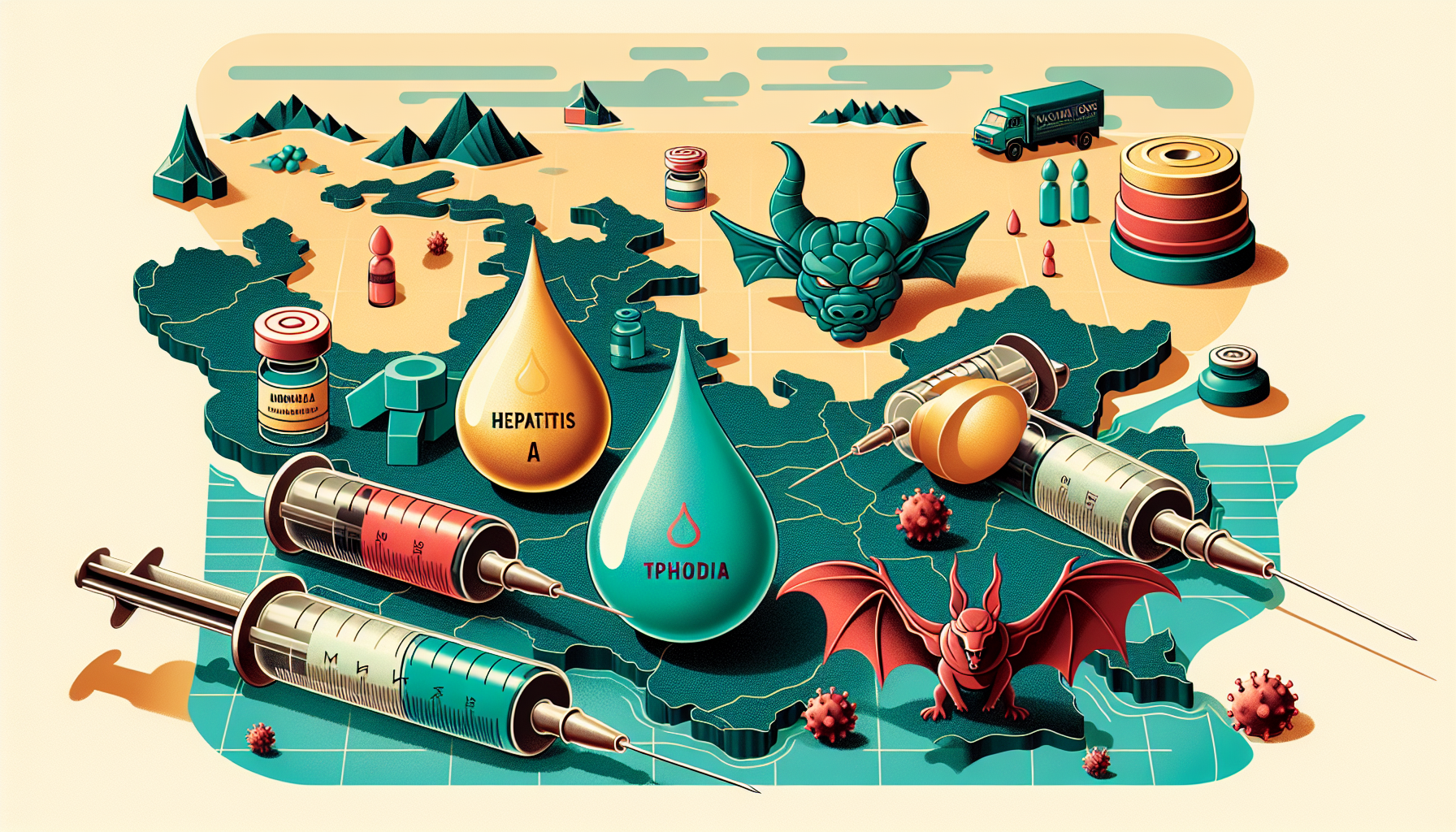Request A Car Rental
Travelling to Mongolia and need a car rental plus extra equipments?
Essential Vaccinations for Mongolia: Your Complete Travel Health Guide
Planning a trip to Mongolia? Knowing the required vaccinations for Mongolia is crucial for a healthy and trouble-free adventure. This complete guide will detail the essential vaccines such as hepatitis A, typhoid, and rabies, tailored to your travel activities and regions within Mongolia you plan to visit, ensuring you’re well-prepared for the health aspects of your journey.
Key Takeaways
- Ensure you’re vaccinated for hepatitis A, typhoid, and rabies for a safe trip to Mongolia, amid risks from foodborne diseases and animal transfers.
- Stay aware of acute mountain sickness when at high altitudes, practice food safety, and maintain personal hygiene to avoid travel-related illnesses.
- Check entry requirements such as visa and passport regulations before visiting Mongolia, and be prepared for medical emergencies by knowing the local service contacts.
Essential Vaccinations for Mongolia Travel

Traveling to Mongolia offers an enriching experience with its natural beauty and unique culture. However, preparing for potential health challenges is a part of this journey. This preparation includes being up-to-date with routine vaccines like tetanus-diphtheria, measles/mumps/rubella (MMR), and polio. Based on your itinerary, you might also need to consider travel vaccinations for hepatitis A, typhoid, and rabies.
Hepatitis A poses a significant health risk in Mongolia, being the most common cause of acute hepatitis cases. Vaccination against this disease is a critical step in safeguarding yourself from health risks and ensuring a smooth journey during your trip to Mongolia.
Hepatitis A and B
Let’s delve deeper into the world of vaccinations. Hepatitis A and B are diseases that can significantly disrupt your travel plans. Fortunately, the national immunization program in Mongolia, started in 1991, includes vaccination against hepatitis B, reducing the incidence of acute hepatitis B. However, it’s always advisable for travelers to consult healthcare providers for vaccination advice.
The prevalence of diseases like Hepatitis A and B in Mongolia emphasizes the importance of vaccination. Keep in mind that preventing these diseases is often less of a burden than treating them, particularly given their potential to significantly impact your health and travel plans.
Typhoid Fever
Typhoid fever represents another potential health risk. This serious disease warrants protection. As a traveler, you should seek personal advice on typhoid fever vaccination from reliable health services like KLM.
Getting vaccinated against typhoid fever contributes to maintaining your health and allows you to enjoy your Mongolian trip without setbacks.
Rabies
While exploring Mongolia’s breathtaking landscapes, you may encounter various mammals. But remember, creatures like dogs and wolves are the primary carriers of rabies in Mongolia. Rabies is an endemic disease, particularly among the canine population in Mongolia.
If your trip involves possible contact with mammals, consider getting a rabies vaccination. Limiting exposure to mammals is key in preventing rabies infections, allowing you to safely appreciate Mongolia’s wildlife without the fear of rabies.
Additional Health Considerations for Mongolia
While vaccinations are crucial, they’re not the only health considerations you need to take into account while traveling to Mongolia. Other health concerns include:
- Respiratory tract infections
- Infectious diarrhea, particularly affecting children
- Brucellosis, which can be transmitted through direct contact with animals or contaminated milk.
Understanding these health risks and taking necessary precautions can help you stay healthy during your trip. Further discussions will tackle additional health considerations such as altitude sickness, food safety, and personal hygiene.
Altitude Sickness
Mongolia’s vast landscapes can take you to new heights, quite literally. However, these high-altitude regions pose a risk of Acute Mountain Sickness, a form of altitude sickness. If you’re planning activities like hiking in the mountains, you need to be aware of the symptoms of altitude sickness, which can occur due to Mongolia’s high elevation.
Fortunately, medication can assist with the adjustments required for acclimatization to high altitudes in Mongolia, aiding in the prevention of altitude sickness. The high-altitude regions of Mongolia often feature cooler temperatures, which can exacerbate the challenges of altitude sickness. So, when venturing to these regions, stay hydrated, acclimatize gradually, and heed any symptoms of altitude sickness.
Food Safety
Experiencing the local cuisine is a big part of traveling, but it’s important to do so safely in Mongolia. To ensure food safety, follow these tips:
- Opt for well-cooked meals
- Choose bottled water over tap water
- Exercise caution with street food
- Verify that meat is thoroughly cooked
- Avoid unpasteurized dairy products
By following these guidelines, you can minimize your exposure to foodborne illnesses while enjoying the local cuisine.
Travelers should be aware of the moderate risk of travelers’ diarrhea throughout the country, which is associated with varying levels of community sanitation and food safety standards. It may be wise to carry medication for self-treatment of diarrhea and an antibiotic for severe cases, especially if traveling in areas with a moderate to high risk of gastrointestinal illnesses.
Personal Hygiene
Maintaining personal hygiene can play a significant role in preventing illnesses while traveling. It’s recommended to carry hand sanitizer, wet wipes, and avoid drinking untreated water from rivers and lakes.
Keeping these simple tips in mind can help you stay healthy and enjoy your trip to Mongolia to the fullest.
Mongolia Entry Requirements and Travel Advice

Before embarking on your Mongolian adventure, understanding the country’s entry requirements and travel advice is of utmost importance. Typically, passports must have at least six months validity upon entry into Mongolia. Your nationality and the purpose of your visit might necessitate adherence to specific visa regulations.
If you plan to stay in Mongolia for more than 30 days, keep in mind that you will need to register with Mongolian Immigration within seven days of arrival. It’s always a good idea to refer to the published guide by the Mongolian Immigration Agency for up-to-date local legal requirements and cultural taboos.
Visa and Passport Regulations
Visa and passport regulations can vary based on your nationality. If you’re planning to work, study, or reside in Mongolia, you must secure an appropriate visa through the Mongolian Embassy in Washington, DC. However, tourists from certain countries, such as UK nationals, are exempt from requiring a visa for short stays up to 30 days in Mongolia.
Always consult the Mongolian Embassy for specific requirements to ensure a smooth entry into the country.
Safety Tips and Emergency Contacts
Staying safe while traveling in Mongolia is paramount. Here are some tips to follow:
- Travel in groups
- Avoid unmarked taxis
- Do not journey alone in unknown or poorly-lit areas
- Always carry your own prescription medications and a first aid kit
- During festivals such as Tsagaan Sar and Naadam, be extra vigilant of pickpocketing risks.
Also, it’s essential to carry original personal identification, like a passport, as copies are not sufficient in Mongolia. While Mongolia has no recent history of terrorism, it’s always wise to remain alert to the possibility of such acts. In case of emergencies, you can reach the following services:
- Medical services: 103
- Contagious disease ambulance: 100
- Fire station: 101
- Police: 102
- National Emergency Management Agency: 105
Traditional Mongolian Medicine and Healthcare

Venturing into Inner Mongolia also means exploring its unique health practices. Traditional Mongolian medicine, influenced by Tibetan medicine, Chinese medicine, and indigenous Mongolian healing techniques, has developed over many years. It’s a world apart from Western medicine, yet it forms a crucial part of the country’s healthcare system, including institutions like Inner Mongolia Medical College.
From maintaining balance among bodily fluids and energies to utilizing natural elements for healing, traditional Mongolian medicine offers a distinct approach to health and wellness. Subsequent sections will further explore the theory of traditional Mongolian medicine and the medical facilities available.
Traditional Mongolian Medicine Theory
Traditional Mongolian medicine, a subject of study at Inner Mongolia University, is based on the concepts of maintaining balance among bodily fluids and energies within the human body, utilizing natural elements to achieve this equilibrium. This holistic approach, often considered a unique medical practice, considers the body as a whole, aiming to maintain harmony within and with the environment. The mongolian medicine volume of knowledge and practices continues to grow as researchers at Mongolia University further explore this ancient healing system, including pharmacology research and scientific research.
Herbal medicine plays a pivotal role in Mongolian medical tradition, with an underlying belief that every plant may possess therapeutic properties. Additionally, Mongolian traditional medicine has integrated techniques like acupuncture from Chinese medicine, creating its own version by burning herbs over meridian points, and employs pulse diagnosis to assess both physical and moral health. It’s a fascinating blend of practices that offer a unique perspective on health and healing, making it a noteworthy form of alternative medicine. In this context, the mongolian medicine compound serves as an example of how different medical traditions can come together to create a holistic approach to health, guided by the expertise of a mongolian physician.
Medical Facilities and Services
When it comes to modern healthcare services, Mongolia has seen significant advancements, especially in urban areas. The healthcare system, developed during the Soviet era, experienced a decline after Russia ceased its support. However, in recent years, foreign investments have contributed to the improvement of healthcare, including the opening of clinics and private hospitals equipped with modern equipment. One such example is the establishment of the Mongolia Medical University, which has played a crucial role in training medical professionals for the country. Additionally, the broader Mongolia University system has been instrumental in fostering educational growth across various disciplines.
In the capital, Ulaanbaatar, medical facilities can handle emergencies, with some English-speaking doctors potentially trained abroad. However, outside the capital, healthcare services are limited, and English-speaking doctors are less readily available. Hence, travelers are advised to see their doctors before visiting Mongolia, bring enough medication for their trip, and ensure they are covered by suitable medical insurance.
COVID-19 Precautions and Updates
The COVID-19 pandemic has changed the way we travel. However, as of June 1, 2021, Mongolia has lifted all restrictions on inbound and outbound travel related to COVID-19. Travelers to Mongolia are not required to provide proof of COVID-19 vaccination, a negative COVID-19 test result, nor undergo health screening procedures at ports of entry.
Moreover, there is no mandatory quarantine requirement for travelers entering Mongolia. With the current COVID-19 guidelines, travelers can visit Mongolia without facing the previous travel and health-related restrictions. Nonetheless, keeping abreast with the latest guidelines is advised, as the situation can evolve rapidly.
Summary
Traveling to Mongolia is an incredible adventure, but it’s crucial to prepare adequately to ensure a safe and healthy journey. From essential vaccinations such as Hepatitis A, B, and Typhoid to understanding the unique practices of traditional Mongolian medicine, health considerations form a significant part of your travel preparations.
Taking the necessary precautions, staying updated with the latest travel advisories, and respecting local customs and practices can help you have a memorable experience in Mongolia. So, saddle up, venture into the vast steppes, and make the most of your Mongolian adventure!
Frequently Asked Questions
What vaccines are required for Mongolia?
You should make sure to have routine vaccinations for Mongolia.
Is there malaria in Mongolia?
No, there is no malaria in Mongolia.
Is it safe for US citizens to travel to Mongolia?
While Mongolia is generally a safe country, it's important for US citizens to be cautious of street crime and violent crime, especially during major festivals and the summer tourist season. Crime is more common in larger towns and cities.
What do you need to enter Mongolia?
You need a valid passport and, if visiting for more than 90 days, a visa to enter Mongolia. Make sure your passport is valid for at least six months beyond your date of arrival. Apply for a visa at the Mongolian Embassy if planning to work, study, or reside there.
What additional health considerations should travelers to Mongolia be aware of?
When traveling to Mongolia, be aware of potential health issues like respiratory infections, diarrhea, altitude sickness, and food safety. Stay mindful of personal hygiene to stay healthy during your trip.
Request A Car Rental
Travelling to Mongolia and need a car rental plus extra equipments?






